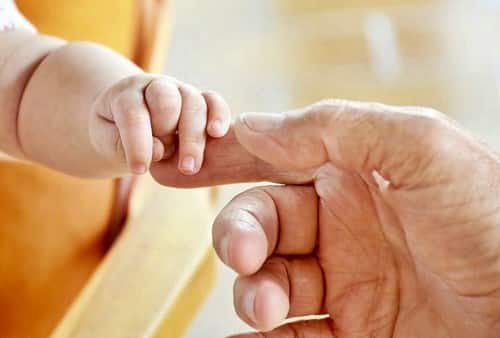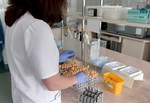Some people are meant to work with babies. Working with newborns and helping them in any way can be a reward on its own. Thankfully, there are dozens of job opportunities available. Babies need just as much care and attention as anyone else. Sometimes, they need even more care.
Everywhere from hospitals and clinics to learning facilities are always looking for qualified people. Careers involving babies and toddlers aren’t the easiest in the world. But, they can be the most rewarding because you know you’re changing the life of someone that can’t yet help themselves.
There are a wide variety of different options. They all have one thing in common: They take someone with a lot of compassion and a gentle touch. Jobs with babies in the medical field are abundant.
If you’ve ever wanted to get into the medical field, even if it’s only part-time, working with newborns is a great way to feel rewarded. What’s the best part? Certain jobs may not even take years of schooling or training.
[su_list icon=”icon: check-circle”]
What Are the Best Jobs with Newborn Babies?
This guide will cover some of the most popular jobs working with babies. Most jobs dealing with newborns happen in a hospital or medical facility. Because there is such a need to fill these positions, it may be easier than you think to find work.
Jobs taking care of babies vary greatly. Some can be peaceful and calm. Others may be quite serious. So, the amount of schooling or training you need depends on the type of job that interests you. Let’s go over some of the most common jobs dealing with newborns. If you’ve ever been interested in working with little ones, the more you know about your options, the better.
1] Labor and Delivery Nurse
When considering working with babies, it’s a good idea to start at the beginning: The birth of a newborn. A labor and delivery nurse is an excellent job for someone looking for a job that involves delivering babies. It’s the responsibility of this nurse to help the mother through the delivery. They work with obstetricians.
Where an obstetrician requires a medical degree, becoming a labor and delivery nurse can vary when it comes to education requirements. All nurses must pass a certification exam. But, you may be able to get a job with as little as an associate’s degree. Once you’ve obtained certification, you can help to work with mothers and babies throughout the delivery process.
Once certification is complete, you can also look into specializations. There are voluntary certifications available for labor and delivery nurses. If you want to look into a more specialized field of labor and delivery nursing, you can choose to get different certifications.
2] Pediatric Physical Therapist
Most people know what a physical therapist does for adults. We don’t often think about babies needing a physical therapist. Unfortunately, it’s one of the most common jobs working with disabled babies. Premature babies can also sometimes need physical therapy.
A pediatric physical therapist helps disabled and injured babies. They can also work with babies who have certain illnesses that can make it difficult to move. Not only can a physical therapist work with babies to encourage proper movement, but they can help with pain.
It can be heartbreaking to hear a baby in pain. It’s the job of a pediatric physical therapist to help ease it. This is usually done through specific movements. They can manipulate the muscles of the baby. They also provide massages to help stimulate and soothe muscles.
Seeing a baby gain mobility and get rid of pain can be extremely rewarding for a pediatric physical therapist. But, to become one can take quite a bit of schooling. A Doctor of Physical Therapy degree is required. Pediatric physical therapists also need to complete a state certification exam.
If you don’t want to go through that much schooling, there are usually physical therapy assistant jobs available. But, if you want to work directly with babies and help them gain mobility, the doctoral degree is required.
3] Infant Massage Therapist
An infant massage therapist is different than a pediatric physical therapist. An infant massage therapist is a job working with premature babies, mostly. Premature babies don’t often have the muscle strength they need. This can make it hard for their muscles and limbs to function correctly.
A massage therapist for babies helps to develop the muscle strength of premature newborns. This career can make it possible for premature babies to grow properly and get stronger. Often, babies born early can live perfectly healthy lives thanks to people who do jobs like this.
Unlike a physical therapist, a doctoral degree isn’t required. An infant massage therapist must complete an infant massage therapy program. They must also get certification in their state.
4] Newborn Hearing Screener
When a baby is born, one of the first things that need to be checked is its hearing. Jobs testing babies hearing are incredibly important. This duty usually falls on a newborn hearing screener. A newborn screening technician/newborn screener works in the neonatal unit of a hospital. They work with neonatal nurses and hospital staff to ensure newborns get all the required testing they need.
This specific test is performed by a neonatal hearing screener. They make sure the equipment is working correctly. They then use that equipment to screen babies to make sure their hearing is where it’s supposed to be. Once they have the results, they can inform the parents of the child. Depending on what the results are, more testing may need to be done. Or, together with the parents, a plan may need to be developed to determine what happens next.
Newborn hearing screeners aren’t with just one baby for too long. But, if you work in a busy hospital, you’ll work with a few babies each day to give them the proper hearing test.
5] Baby Sign Language Instructor
Sign language instructors for babies don’t usually work in hospitals. But, they can often be recommended by medical facilities. If it’s discovered that a baby has hearing problems, they may need to learn sign language. Jobs teaching babies sign language can be incredibly rewarding, because it may be their only form of communication.
To become a qualified instructor, you need to know American Sign Language. There are specific courses involved in this process. In most cases, you can become an Independent Certified Instructor (ICI) by taking a course on your own. There are also programs all over the country that specifically focus on sign language for babies and toddlers. If communication is your passion, this position is a wonderful opportunity to give a child the ability to ‘speak.’
6] NICU Volunteer
If you’re not necessarily looking for a full-time job, consider volunteering. Jobs taking care of babies can be rewarding on their own, even without payment. Most busy hospitals in the country are in need of trustworthy volunteers to work in their neonatal units.
The most popular options include jobs holding babies in hospitals. Sometimes, a baby only needs to be held to benefit their health. Many babies aren’t able to be held by their parents. Others have no one around to give them the attention they need. Studies have shown that being held can benefit their emotional and physical state.
As you might expect, there is no formal education necessary for this type of job. It is usually a volunteer position. Every hospital may have different requirements for this position. But, it’s likely you’ll have to volunteer at the location for a few months before you’re able to spend time holding babies directly. Some minor training may also be necessary, as well as a background check.
If you’re willing to give your time and care to newborns who need it most, you can find a lot of happiness and reward in holding babies.
7] Phlebotomist
Phlebotomists work with a wide variety of patients on a daily basis. Sometimes, that includes working with babies. In most cases, newborns don’t need to get a lot of blood drawn. Any blood that is taken can usually be done with a finger prick, like the Bilirubin test.
If there are any issues or concerns with a newborn, though, more bloodwork may need to be done. As a phlebotomist, drawing blood from newborn babies isn’t much different from drawing blood from adults. But, the location of the blood draw is usually different. In babies, phlebotomists usually draw from the heel of the foot.
A phlebotomy technician may need the help of a parent or other staff member to immobilize the baby during the blood draw. This will help to ensure the baby doesn’t suddenly move and cause an accident with the needle.
To become a phlebotomist, specialized training is required. You don’t need to have a college degree, but it can help to kickstart your career. But, other training programs can take up to a year with certification.

8] Pediatrician
A pediatrician works with newborn babies all the way up until they are a teenager, or into early adulthood. Pediatricians can work in hospitals or clinics. Some even have their own private practices. It’s a great way to develop lasting relationships with patients. But, you’ll also likely see a wide variety of different kids each day.
Pediatricians do everything from performing general wellness exams to treat injuries and illness. They can immediately provide care for a baby after birth.
To become a pediatrician, medical school is required. Choosing to become a pediatrician is considered a specialization. During your residency, you’ll determine what type of doctor you want to be. This decision will help you to hone in on that particular skill and field.
9] Midwife
Most people think a midwife is only there to help mothers through the delivery process. While it’s true that midwives provide support to expectant mothers, they are also there for the wellbeing of a new baby.
Midwives not only provide care for mothers, but they can also deliver babies. Some mothers prefer to have a midwife instead of an obstetrician. Midwives more commonly help with home births than hospital births.
Becoming a midwife doesn’t need a medical degree. If you’ve ever had an interest in working with pregnant women and delivering babies, this is a great option. For this position, you must go through specialized training to deliver babies. You can also become a nurse midwife, which covers the same duties. Nurse midwives do need nursing credentials to be official.
People often compare midwives with doulas, but they are two different jobs. A midwife is considered a healthcare provider. A doula doesn’t usually deliver babies. They instead focus on the mother and her needs. They coach the mother through the birthing experience, trying to make it easier for her and adapting to her needs. Doulas, like midwives, usually partake in home births. But, they can also be by a mother’s side in a hospital. They just cannot deliver the baby as they are not a medical professional.
10] Newborn Specialist
Newborn specialists don’t typically work in hospitals. Instead, they work with new parents in the home during the first month or two of a baby’s life. This job consists of a variety of different duties.
Some include:
- Preparing bottles for feeding
- Changing, cleaning, and dressing the baby
- Helping mother with breastfeeding and latching
- Caring for the baby overnight to help parents get some sleep
There are many different reasons parents choose to hire a newborn specialist. Sometimes, they just need the extra help (especially if they are first-time parents). Or, one parent may have a condition that prevents them from taking care of the baby on their own for a while. A woman struggling with postpartum depression can feel better with the help of a newborn specialist.
This job requires certification from an accredited agency. CPR certification is also necessary. If you think this might be an excellent job for you, it’s essential to have the right set of skills. Some skills to keep in mind are:
- Knowledge of baby basics
- Highly organized
- Housekeeping skills
- Communication skills
- Patience and compassion
This is an intimate job and involves a lot of one-on-one time with new babies and new parents. It can take some time to build up a quality reputation as a newborn specialist. Once you do, though, it can be rewarding to develop close relationships with babies in their first few months of life.

Nanny or Nursery Workers
One hands-on job that deals with babies once they are out of the hospital is being a nanny or nursery worker. These are hired positions by families or facilities. Nannies are usually hired by the family of the baby. They can either live with the family to care for the baby all the time, or just certain hours of the day.
Nursery workers usually work with babies for a few hours each day, while parents are at work. Duties of both of these positions include basic care needs for the baby. Everything from feeding and changing to playtime and nap time should be covered.
It isn’t required that you have a degree to be a nanny or nursery worker. Some organizations or parents hiring may prefer you to have a degree or formal training. Mostly, though, a background check and experience working with kids is enough to secure a position like this. Many parents and daycares will also prefer someone with CPR certification and some medical experience.
Nannies and daycare workers can work with children of all different ages, starting in infancy. If you secure a nanny job with a particular family, you may work with the same child/children from the time they are born into their teenage years.
How Can I Get a Job Working with Babies?
As you can see, there are many different jobs where you’re able to work directly with babies. Medical jobs with babies can be some of the most rewarding. Many of them don’t need a medical degree or years of training. In most cases, you can find a job dealing with babies with a minimal amount of training.
If you do want to work in the medical field with newborns, there are a variety of different options. These options can vary in how hands-on you’ll be able to be. All are helpful to both the baby and usually the mother, too. Even volunteering at a hospital nursery center can be beneficial for new babies, especially those who are born prematurely.
We hope this guide has given you some helpful ideas if you’re interested in working with babies. Not only are these positions usually quite rewarding, but many of them come with lucrative salaries, too. Hospitals are always looking for qualified individuals to fill these positions. Working with newborns isn’t for everyone, but if you have a passion for it, you can find a lot of satisfaction in the work.
[/su_list]






